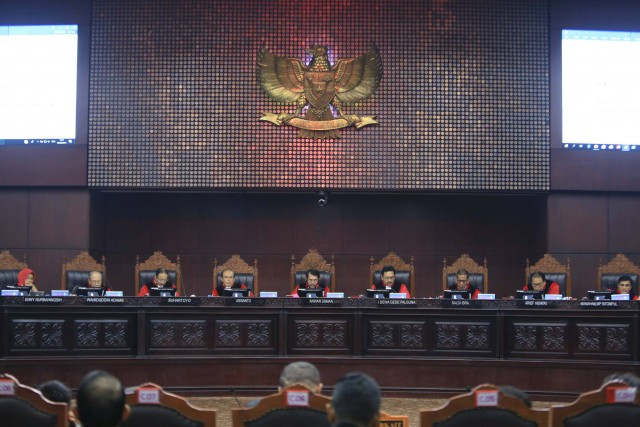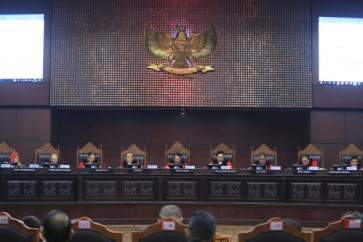Popular Reads
Top Results
Can't find what you're looking for?
View all search resultsPopular Reads
Top Results
Can't find what you're looking for?
View all search resultsAnalysis: Court upholds election results, as expected
Change text size
Gift Premium Articles
to Anyone
U
nsurprisingly, the Constitutional Court put an end to all election result disputes by rejecting the legal challenges put forward by losing presidential candidates Anies Baswedan and Ganjar Pranowo. In two separate five-to-three majority rulings on Monday, the justices upheld the landslide victory of president-elect Prabowo Subianto and his running mate, Gibran Rakabuming Raka.
Although the court found no evidence of fraud or state meddling to influence the results of the Feb. 14 presidential election, three justices, namely Saldi Isra, Arief Hidayat and Enny Nurbaningsih, voiced dissenting opinions that called for a revote in provinces where state intervention in the form of social aid disbursement helped sway the vote in favor of the Prabowo-Gibran ticket.
In his dissenting opinion, Saldi condemned the General Elections Commission (KPU) for its lack of fairness in this year's presidential race. He also agreed with the plaintiffs that the disbursement of social aid by President Joko "Jokowi" Widodo, Gibran's father, during the November to February campaign period worked in favor of the Prabowo-Gibran pair, who championed the continuation of the outgoing President's policies and programs. Moreover, Saldi also proposed that in the future, the Constitutional Court should be allowed to handle cases concerning the ethics and execution of the entire electoral process, rather than only election results disputes, as is the current practice.
From the beginning, it seems that both the petitioners, Anies and Ganjar, knew they stood a slim chance of convincing the court to annul the election results. The unprecedented dissenting opinions from the three progressive justices were the best they could hope for, even if they could not change anything.
Historically, the court has never decided on a nationwide rerun of the presidential polls. While the court has ruled for a revote before, this refers to the 2021 regional election in Sabu Raijua, East Nusa Tenggara, in which the regent-elect was found to have dual citizenship, ordering a revote for the country's highest office would have repercussions that would inevitably result in instability in Indonesia's political landscape.
After all the brouhaha, with allegations of the misuse of state apparatus and resources at the center of the presidential elections dispute case, the Elections Supervisory Agency (Bawaslu) expressed its commitment to monitoring the distribution of social aid during the simultaneous regional elections slated for Nov. 27 this year.
Bawaslu chairman Rahmat Bagja reiterated that the poll watchdog would uphold the neutrality of the state apparatus and the implementation of government-led programs, considering that the November elections would be more complex than the previous elections since this year they would be held simultaneously across all provinces, cities and regencies, except for the special region of Yogyakarta.



















